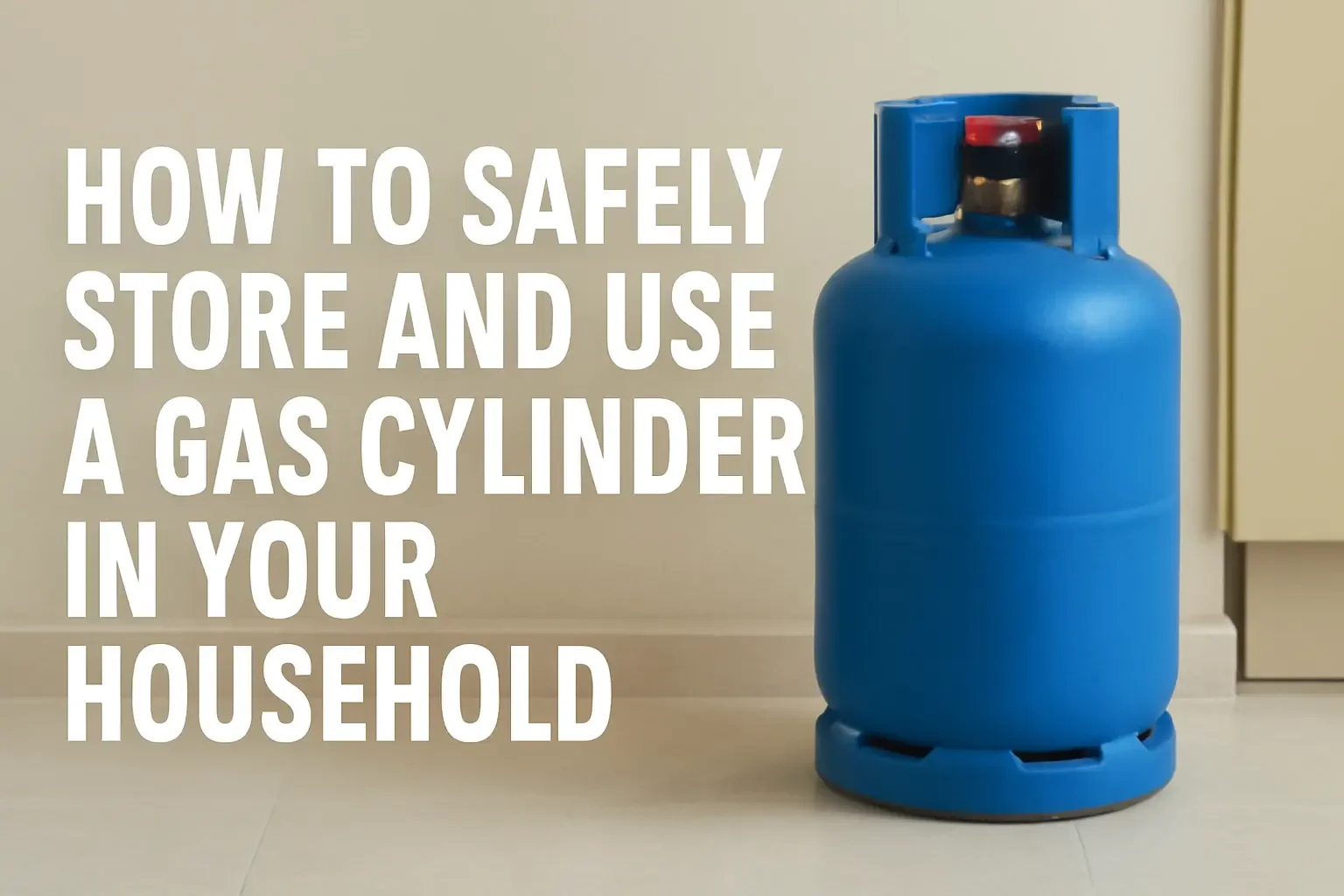How to Safely Store and Use a Gas Cylinder in Your Household
Gas cylinders are essential items in many households. Whether used for cooking, heating, or other purposes, gas cylinder must be handled with care to ensure safety. Proper storage, maintenance, and usage are crucial to prevent accidents and ensure the longevity of the cylinder.
Understanding Gas Cylinders
A gas cylinder is a container designed to store pressurized gas for various applications. In households, common gases include liquefied petroleum gas (LPG), natural gas, and butane. These gases are highly flammable and can be dangerous if not handled properly. Gas cylinders are typically made of steel or aluminum and are equipped with safety valves to regulate the pressure.
1. How to Safely Store a Gas Cylinder
Proper storage of a gas cylinder is one of the most important factors in ensuring safety. Here are some key guidelines for storing your gas cylinder:
A. Choose the Right Location
The location of your gas cylinder is crucial for safety. The cylinder should always be stored in a well-ventilated area, away from sources of heat or ignition, such as stoves, heaters, or electrical appliances. Do not store the cylinder in areas with high humidity, such as bathrooms or near water sources, as moisture can damage the cylinder and its valve.
B. Keep the Cylinder Upright
Gas cylinders should always be stored in an upright position. This ensures that the gas remains in its proper phase (liquid or gas) and prevents leaks. Never store a gas cylinder on its side or upside down, as it may lead to gas leakage or malfunctioning of the valve.
C. Store Away from Children and Pets
Always store your gas cylinder in a secure, out-of-reach area to prevent accidents involving children or pets. Make sure the cylinder is placed in an area where it cannot be knocked over or damaged.
D. Keep Away from Flammable Materials
Avoid placing gas cylinders near combustible materials such as paper, cloth, or chemicals. If a leak occurs, the gas can easily ignite and cause a fire or explosion.
E. Protect from Extreme Temperatures
Gas cylinders should never be stored in direct sunlight or near any heat sources. High temperatures can increase the pressure inside the cylinder, leading to dangerous situations. It is important to store the cylinder in a cool, shaded area.
2. How to Use a Gas Cylinder Safely
Once you’ve ensured your gas cylinder is stored properly, the next step is to use it safely. Here are several important tips for safe gas cylinder usage:
A. Check for Leaks Before Use
Before using a gas cylinder, always check for any leaks. You can do this by applying soapy water to the cylinder’s valve and checking for bubbles. If bubbles form, it indicates a leak, and you should not use the cylinder. In case of a leak, shut off the valve immediately and replace or repair the cylinder.
B. Open the Valve Slowly
When using a gas cylinder, always open the valve slowly. A sudden release of gas can cause a dangerous burst or leak. If you are using a gas cylinder for cooking or heating, always ensure that the appliance is turned off before opening the valve.
C. Turn Off the Cylinder After Use
Always turn off the gas cylinder valve after you have finished using it. Leaving the valve open when the appliance is not in use increases the risk of a gas leak, which can lead to a fire or explosion.
D. Use Proper Appliances
Ensure that the appliances you are using with the gas cylinder are compatible with the type of gas in the cylinder. For example, if you are using LPG, ensure that the stove or heater is specifically designed to handle LPG. Using the wrong type of appliance can result in dangerous situations.
E. Monitor the Cylinder Pressure
It is important to monitor the pressure of the gas cylinder while in use. If the pressure seems too high or too low, it could be a sign of a malfunction or a faulty regulator. If you notice anything unusual, stop using the cylinder immediately and seek professional assistance.
3. Gas Cylinder Maintenance Tips
Proper maintenance of your gas cylinder is essential to ensure its safe and efficient operation. Here are some maintenance tips to keep in mind:
A. Regularly Inspect the Cylinder and Valve
Check your gas cylinder regularly for any signs of wear or damage. Look for any rust, dents, or cracks in the cylinder. Pay close attention to the valve, as it is a critical component in controlling the flow of gas. If you notice any issues, replace the cylinder or valve immediately.
B. Avoid Dragging or Dropping the Cylinder
Gas cylinders are designed to withstand pressure, but they can be damaged if dropped or dragged. Always handle the cylinder with care, and never allow it to roll or fall.
C. Get Professional Inspections
It is a good idea to have your gas cylinder inspected by a professional every few years. They can check for any issues that might not be immediately visible to you, such as pressure regulation problems or potential leaks.
4. What to Do in Case of a Gas Leak
A gas leak is one of the most dangerous situations when dealing with a gas cylinder. If you suspect a leak, follow these steps immediately:
Do Not Light Matches or Flames: Never attempt to light a match or spark any kind of flame when you suspect a gas leak. This could cause a fire or explosion.
Shut Off the Valve: If possible, turn off the valve of the gas cylinder to stop the flow of gas.
Ventilate the Area: Open windows and doors to allow fresh air to circulate and disperse the gas. Avoid turning on any electrical switches, as this can create sparks.
Evacuate the Area: Leave the area immediately and avoid re-entering until the gas leak is fixed.
Call for Professional Help: Contact a professional gas technician to inspect the cylinder and make any necessary repairs.
Frequently Asked Questions (FAQ)
1. How long can a gas cylinder be safely used in the household?
A gas cylinder can be safely used for many years if properly maintained. However, regular inspections and adherence to safety guidelines are necessary to ensure its continued safety. Replace any cylinder that shows signs of damage or wear.
2. What should I do if my gas cylinder is leaking?
If your gas cylinder is leaking, turn off the valve immediately, ventilate the area, and evacuate the space. Do not attempt to stop the leak yourself unless you are trained to do so. Contact a professional to inspect and repair the cylinder.
3. Can I store a gas cylinder in a basement?
It’s not advisable to store a gas cylinder in a basement, especially if it is not well-ventilated. If the basement has poor airflow, any gas that leaks could accumulate and create a dangerous situation.
4. Can I store a gas cylinder in my kitchen?
While it is possible to store a gas cylinder in the kitchen, it should be placed in a well-ventilated area, away from heat sources or flames. Always ensure the cylinder is upright and not near any flammable materials.
5. How often should I inspect my gas cylinder?
You should inspect your gas cylinder at least once a year for signs of wear, damage, or leaks. If you notice anything unusual, have it checked by a professional immediately.
6. Is it safe to use a gas cylinder indoors?
Yes, it is safe to use a gas cylinder indoors, provided it is stored and used correctly. Always ensure that the area is well-ventilated, and the gas cylinder is not near any heat sources or open flames.
By following these safety tips for storing and using a gas cylinder, you can help prevent accidents and ensure a safe environment in your household. Always prioritize safety, and consult professionals if you are ever unsure about handling or maintaining your gas cylinder.

